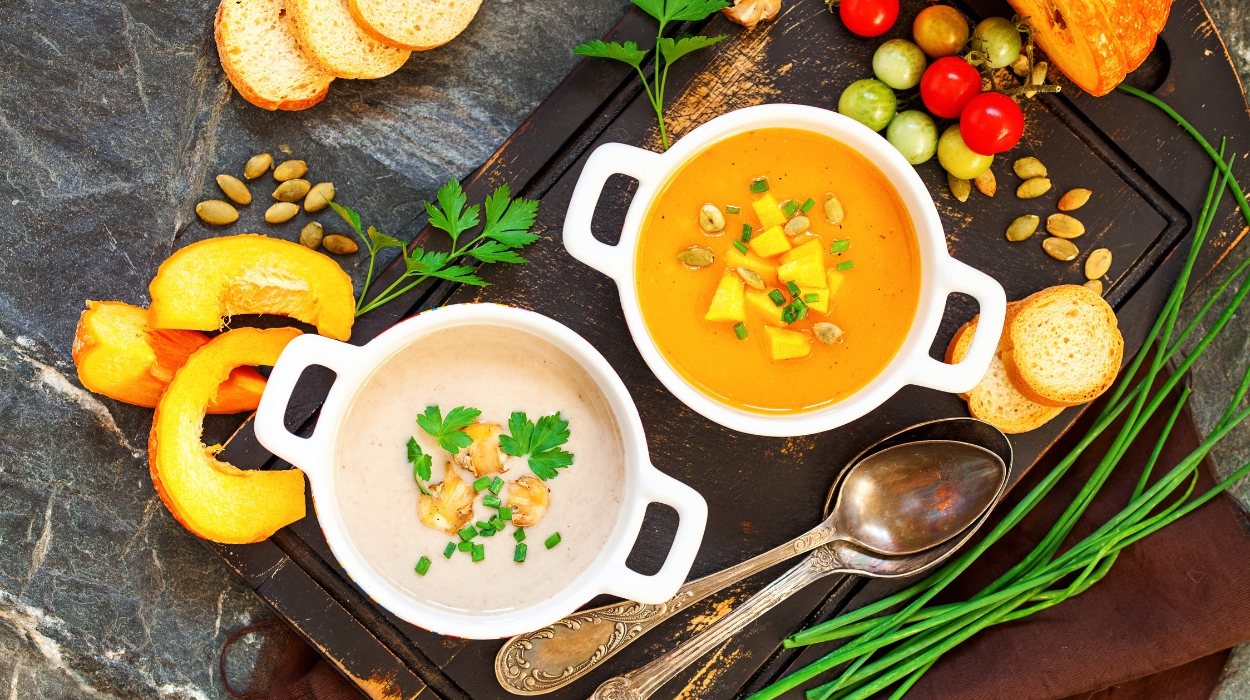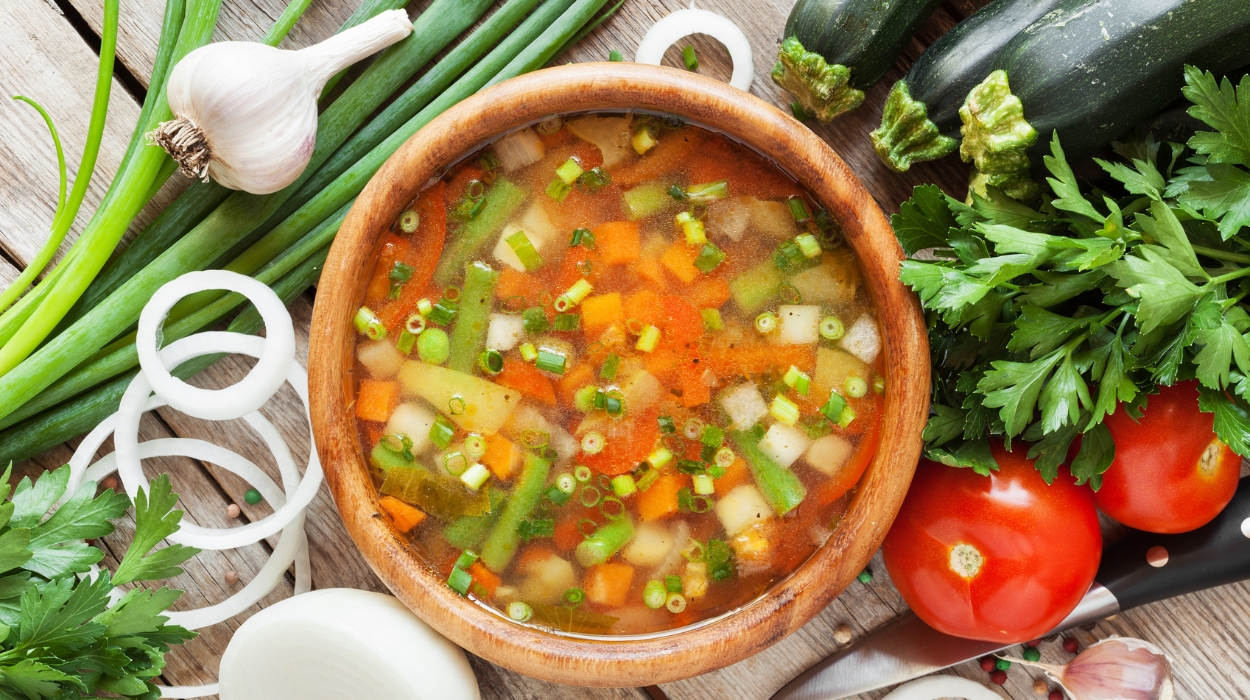Soup is a popular home remedy for the flu, fevers, and other mild illnesses. With many uses, you may wonder if soup is healthy for weight loss as well.
In order to successfully lose weight, you must watch what you eat. Overeating is the easiest way to gain weight. So, is soup good for weight loss?
In this article, we’ll look at soup’s nutritional values and decide whether it’s a good addition to your weight loss diet. Keep reading to find out which soups you should eat to lose weight fast, naturally, and permanently.
Is Eating Soup Good For Weight Loss?
Yes. Soup can help you lose weight by reducing your daily calorie intake and increasing satiety before meals. It also hydrates you, which improves your metabolism and helps you lose weight faster.
Is Soup Good For Weight Loss?

It’s pretty difficult to definitively answer whether a soup diet is effective for losing weight. Soup diets are as diverse as the types of ingredients they’re based on. However, a Cambridge study[1] concludes that eating soup regularly helps you manage weight.
Eating soup only and avoiding solid food will help you lose weight quickly due to its low-calorie content. However, this is not a long-term strategy because you’ll eventually need to eat solid food.
Therefore, you’ll still need to try other weight loss methods to maintain a healthy weight in the long run. Soup may not meet your daily nutritional requirements, so you’ll eventually have to revert to solid food and eat soup occasionally.
The Nutritional Value Of Soup
The nutrients found in soup will heavily depend on the soup’s ingredients. The nutrients you get from cabbage soup are not the same as the ones from bone soup.
The only common ingredient you’ll find in each bowl of soup is water. Therefore, eating soup will increase your daily hydration regardless of which ingredients you choose. Outside of that, different soups’ taste, nutrition, and calorie-count can significantly vary.
Water is often ignored as a part of a weight loss diet, but it’s essential in improving your metabolism.[2] This will help your body burn calories faster, improving weight loss.
What Soup Is Good For Weight Loss?

Cabbage Soup
If you like vegetables, finding the right soup diet will be a walk in the park. There are many things to like about a cabbage soup diet, including the fact that it’s vegetarian and vegan-friendly. Cabbage also has lots of fiber which will reduce how hungry[3] you get in between meals.
Most soup recipes allow you to be creative and add whatever you think will make the soup taste better to the pot. That’s not the case for a cabbage soup diet. Cabbage soup only focuses on one ingredient: cabbage. This makes cabbage soup healthier and better for weight loss with cocktail soups that might have ingredients with tons of calories and saturated fats.
Garlic & Vegetable Soup
Garlic is a special vegetable with many benefits, including regulating blood pressure and improving heart health. Therefore, it’s easy to understand why garlic is also good for weight loss. It burns[4] low density lipoproteins, which is the type of cholesterol that causes uncontrollable weight gain and many life diseases.
If you don’t like how the soup tastes, you can make it taste better by adding vegetables or other healthy ingredients you have around. The garlic will work on reducing your cholesterol, while the veggies fill you up without raising your calorie intake drastically.
Carrot And Ginger Soup
Carrot and ginger soup will give you some fiber and very few calories. So you can eat to your fill without worrying about derailing your weight loss diet.
Ginger water reduces weight gain,[5] while carrot juice reduces the weight of people with type 2 diabetes.[6] These ingredients and other vegetables you might add will help you stay full without gaining weight.
White Beans And Vegetable Soup
You can make soup from anything you have left over in your kitchen. White beans and veggie soup is one of those soups you can DIY to your taste.
White beans and vegetable soup have few calories but tons of protein, things you should expect from a weight loss food. Ideally, you can replace it for your high-calorie meals like breakfast.
After the base ingredients, you can add any vegetables to make it tastier and more filling. Just ensure you don’t add ingredients with many calories.
Roasted Butternut Blended Soup
If you want a soup that supports weight loss and improves your health, roasted butternut blended soup is your best option. You can make lots of roasted butternut blended soup and refrigerate it for up to 3 months.
Blended soup will leave you feeling fuller[7] despite having the same nutritional benefits as regular soup. Butternut blended soup is particularly a nutritional powerhouse because it’s rich in beta-carotene, which converts into vitamin A. The soup also has a high fiber content, which helps you stay full.
Butternut soup can also stop you from bloating by regulating the bacteria in your gut.[8] This helps limit the number of calories you eat in the meals after the soup.
Tomato Soup
Tomato soup is another popular soup because it’s tasty, and you can add almost anything without ruining it. Most of the soup’s health benefits come from lycopene, the antioxidant pigment that makes tomatoes red.
Lycopene is an antioxidant that destroys free radicals,[9] which cause weight gain, obesity,[9] and cardiovascular diseases.[10] Therefore, eating tomato soup will not only help you slim but also avoid heart disease.
Chicken Soup
Chicken soup is probably everyone’s favorite fever and flu remedy. Although there’s no evidence to prove that it helps, don’t make chicken soup only when you feel unwell.
Chicken soup can be a delicious alternative to a regular full meal. A chicken soup diet is also a good way to start intermittent fasting because it keeps you full for hours.
The Cream Of Mushroom Soup
It’s generally advisable to avoid creamy soups because it usually means more calories and saturated fats. However, when it comes to mushroom soup, the cream mostly comes from blended white beans, which are low in fat and calories. So it gives the soup a pleasant texture at no cost to your calorie intake.
Other Things To Keep In Mind
While there’s no debate on the general benefits of soup on weight loss, not every bowl of soup will be good for you. You need to think about a few things before you create your next weight-loss soup recipe.
Don’t Use Thickening Agents
While creamy soup is delicious, it’s definitely not as healthy as smooth soup. Most popular thickening agents are packed with fat including coconut cream, heavy cream, cheese, roux, and eggs. While these creams can be healthy in small amounts, it’s easy to use too much when making a cream-based soup.
Most thickening agents are calorie-dense, meaning you’ll eat as many calories as you would with solid food. Eating calorie-dense foods also means you’re eating more calories than your body needs, promoting weight gain.[11]
Make The Soup Yourself
Soup is so dynamic that you can make it with almost anything you have in your kitchen. So, it’s better to make your soup recipes with the ingredients you require for weight loss and things you enjoy eating.
Canned soup might be tasty, but sometimes it has many additives, which increase the number of calories. Some preservatives in commercial soup might also diminish the weight loss benefits of soup.
With homemade soup, you also pick how much of each ingredient to use. For instance, if you’re not too fond of garlic, you can mask its taste in garlic soup with diverse vegetables like carrots and broccoli.
Canned soups will also often have high sodium content. High sodium intake can worsen hypertension[12] and is a risk factor for kidney[13] and cardiovascular[14] diseases, especially if you’re obese.
You Still Need Exercise
Even the best soup diet is not a replacement for a good workout session as a way to lose weight. Whether you’re eating soup while fasting or using it to replace high-calorie meals, you’ll still need to reach your daily steps and other workout goals to get and maintain a healthy weight.
However, if you’re using soup as part of a very low-calorie diet, you might want to avoid intensive exercises like lifting weights and HIIT routines. Since you don’t have too many calories to burn, you can try more laid-back exercises like walking and yoga.
Find A Good Relaxation Method
When we think about the causes of weight gain, we often forget that stress is a major factor. As humans, we’ll have to encounter stressful situations from time to time. However, your reaction to stress will determine whether it contributes to weight gain.
Therefore, if you want to lose your belly fat and maintain a healthy weight, you’ll need to find effective relaxation techniques that work for you. While there’s no universal way to relieve stress, you can try proven relaxation methods like practicing mindfulness and deep breathing.
The best relaxation techniques don’t need any special equipment or space. So, you can do your breathing exercises whenever and wherever you’re stressed.
Conclusion
Besides being a good homemade remedy we take when we have the flu, soup has many nutritional benefits. Soup is an excellent source of protein, vitamins, and minerals, depending on your ingredients.
Soup will also hydrate you because water is its main ingredient. Most soups will also have considerable protein and fiber content, which help you stay full with little calorie intake.
Frequently Asked Questions
Yes, eating soup is one of the best ways to lose weight because it reduces the calories you consume from other foods.
Yes, soup helps you avoid high-calorie foods that sustain your belly fat. It also hydrates you, an essential part of belly fat loss.
Yes, you’re likely to lose weight if you eat soup every day. However, you need to use other weight loss methods to maintain a healthy weight in the long term.
The amount of weight you lose from eating soup depends on the soup’s ingredients. You might also lose more weight if you work out or use a weight loss supplement.
Many soups can help you lose weight. However, soups from foods that burn fat, like garlic, are the best for weight loss.
It’s okay to use fat burners and supplements when you’re on a soup diet, as long as they don’t interact with the soup’s ingredients.
The best time to use soup as a weight-loss food is when you consume many calories. If you have a high-calorie breakfast or dinner, you can replace it with soup.
Chicken is one of the best meats for weight loss. So, chicken soup is equally as good. It’s low in calories and protein, reducing hunger and keeping weight gain at bay.
 Evidence Based
Evidence Based

